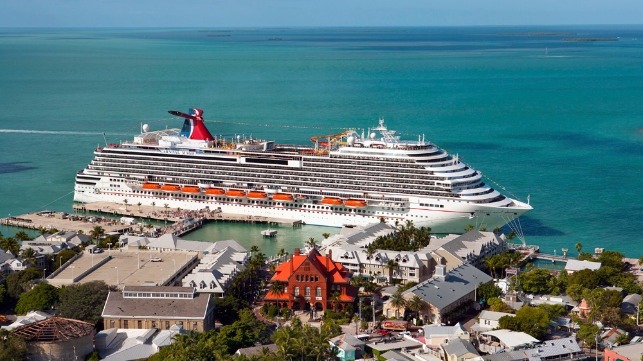Bill to Overturn Key Cruise Restrictions Sinks in Florida House

In a last-minute surprise maneuver, Florida’s House of Representatives sidelined for this session a bill that would have limited local ports’ ability to take actions deemed to have the potential to interrupt state or national commerce. Widely believed to have been a veiled attempt to override referendums approved by the voters in Key West to limit cruise ship calls, the bill was scuttled by proposed amendments and politics after having passed the state senate and seemingly destine to the governor for his approval before the legislative session concludes this week.
After numerous revisions as it worked its way through the various committees, the bill had evolved into something in the end that even its sponsor started to question the legality of the legislation. The initial proposal put forward at the beginning of the session was to limit the authority of 15 municipally managed seaports in Florida from adopting any restrictions that would limit the nature of the ships or their cargoes from coming into the ports. Sponsored argued that the authority to control ports and their contribution to state and national commerce lay only at the state or federal level.
Faced with stiff opposition for many of the seaports across the state and lobbyists, the bill was narrowed first exempting individual ports and finally being re-written to restrict local government from making rules impacting the maritime trade specifically in or near “areas of critical state concern.” The definition included areas of environmental and economic importance to the state. Reports from Florida said, however, that the only port that met the revised criteria was Key West.
After passing the Senate last week, the bill was read on the floor of the House on Monday with proposals for further revisions quickly coming forward. Questions began to arise if the narrow nature of the bill violated a state law the forbids making rules to override a single local jurisdiction. There were also further objections to the preemptive nature of the bill, which like many others in Florida would have made it retroactive, which in effect would have overridden the Key West referendums voters overwhelmingly approved in November 2020.
Saying that there is not enough time to reconcile additional changes in the bill with the Senate before the end of the session this week and recognizing that the narrowed bill had lost its original purpose, the legislators sponsoring the bill said late yesterday that the bill is dead for this session. They promised to re-introduce a new bill in the next session returning to the original broader purposes of their proposal.
Further complicating the situation was a report in the Miami Herald linking nearly $1 million in political donations from a Key West developer, who owns one of the piers, made to Florida Governor Ron DeSantis just before the beginning of the current legislative session. DeSantis has in the past vetoed preemptive legislation and is concerned over his image as he is believed to be preparing for a 2024 run for president.
The death of the bill again opens the question of if the Key West referendums can be applied to all the piers in the popular tourist destination or only to the publicly-owned downtown pier. Opponents have argued that the voters did not have the right to stop the cruise ships from docking at a privately owned pier. While that issue might end up in the courts, it is also believed that opponents will seek support from the Federal Maritime Commission to override the referendums. Key West voters approved limits on the size of cruise ships docking in their town as well as the number of people, both passengers and crew, permitted to come ashore each day. They also approved giving priority to ships with the best environmental records.

that matters most
Get the latest maritime news delivered to your inbox daily.
Possibly encouraged by the success of these efforts to limit cruise ships, citizens in Juneau, Alaska also recently moved to put an item into their upcoming elections to limit cruise ships. In Bar Harbor, Maine, the local town council has also been considering the issue and recently launched a survey of residents to determine their views on the cruise ships and if they should move to limit cruise ship calls.
These efforts are moving forward at a time when cruise ship calls at the ports continue to be postponed. Other than a limited number of small cruise ships, neither Alaska nor Maine is likely to have any large cruise ship calls in 2021 as the industry waits for actions from the U.S. Centers for Disease Control and Prevention.
